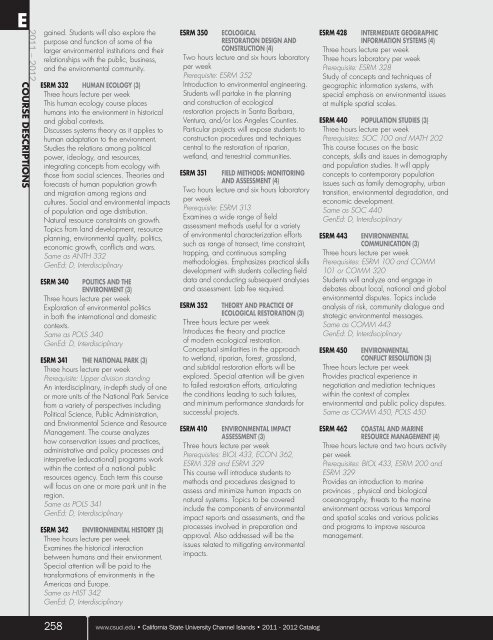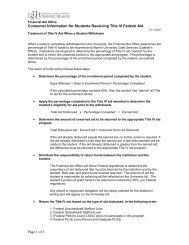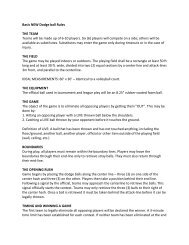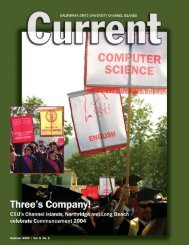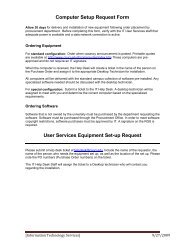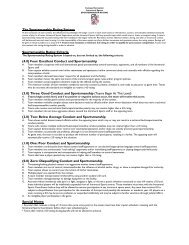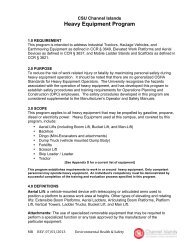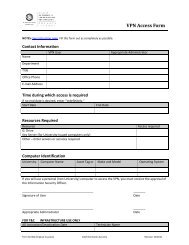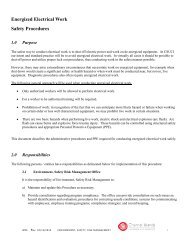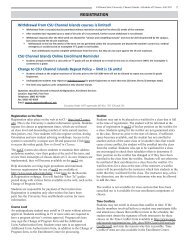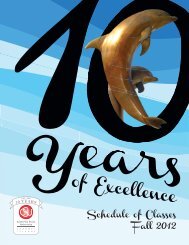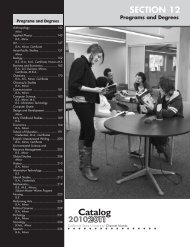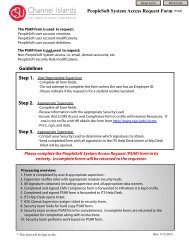Download printable catalog - CSU Channel Islands
Download printable catalog - CSU Channel Islands
Download printable catalog - CSU Channel Islands
Create successful ePaper yourself
Turn your PDF publications into a flip-book with our unique Google optimized e-Paper software.
2011 – 2012Course Descriptionsgained. Students will also explore thepurpose and function of some of thelarger environmental institutions and theirrelationships with the public, business,and the environmental community.ESRM 332 HUMAN ECOLOGY (3)Three hours lecture per weekThis human ecology course placeshumans into the environment in historicaland global contexts.Discusses systems theory as it applies tohuman adaptation to the environment.Studies the relations among politicalpower, ideology, and resources,integrating concepts from ecology withthose from social sciences. Theories andforecasts of human population growthand migration among regions andcultures. Social and environmental impactsof population and age distribution.Natural resource constraints on growth.Topics from land development, resourceplanning, environmental quality, politics,economic growth, conflicts and wars.Same as ANTH 332GenEd: D, InterdisciplinaryESRM 340 POLITICS AND THEENVIRONMENT (3)Three hours lecture per weekExploration of environmental politicsin both the international and domesticcontexts.Same as POLS 340GenEd: D, InterdisciplinaryESRM 341 THE NATIONAL PARK (3)Three hours lecture per weekPrerequisite: Upper division standingAn interdisciplinary, in-depth study of oneor more units of the National Park Servicefrom a variety of perspectives includingPolitical Science, Public Administration,and Environmental Science and ResourceManagement. The course analyzeshow conservation issues and practices,administrative and policy processes andinterpretive (educational) programs workwithin the context of a national publicresources agency. Each term this coursewill focus on one or more park unit in theregion.Same as POLS 341GenEd: D, InterdisciplinaryESRM 342 ENVIRONMENTAL HISTORY (3)Three hours lecture per weekExamines the historical interactionbetween humans and their environment.Special attention will be paid to thetransformations of environments in theAmericas and Europe.Same as HIST 342GenEd: D, InterdisciplinaryESRM 350 ECOLOGICALRESTORATION DESIGN ANDCONSTRUCTION (4)Two hours lecture and six hours laboratoryper weekPrerequisite: ESRM 352Introduction to environmental engineering.Students will partake in the planningand construction of ecologicalrestoration projects in Santa Barbara,Ventura, and/or Los Angeles Counties.Particular projects will expose students toconstruction procedures and techniquescentral to the restoration of riparian,wetland, and terrestrial communities.ESRM 351 FIELD METHODS: MONITORINGAND ASSESSMENT (4)Two hours lecture and six hours laboratoryper weekPrerequisite: ESRM 313Examines a wide range of fieldassessment methods useful for a varietyof environmental characterization effortssuch as range of transect, time constraint,trapping, and continuous samplingmethodologies. Emphasizes practical skillsdevelopment with students collecting fielddata and conducting subsequent analysesand assessment. Lab fee required.ESRM 352 THEORY AND PRACTICE OFECOLOGICAL RESTORATION (3)Three hours lecture per weekIntroduces the theory and practiceof modern ecological restoration.Conceptual similarities in the approachto wetland, riparian, forest, grassland,and subtidal restoration efforts will beexplored. Special attention will be givento failed restoration efforts, articulatingthe conditions leading to such failures,and minimum performance standards forsuccessful projects.ESRM 410 ENVIRONMENTAL IMPACTASSESSMENT (3)Three hours lecture per weekPrerequisites: BIOL 433, ECON 362,ESRM 328 and ESRM 329This course will introduce students tomethods and procedures designed toassess and minimize human impacts onnatural systems. Topics to be coveredinclude the components of environmentalimpact reports and assessments, and theprocesses involved in preparation andapproval. Also addressed will be theissues related to mitigating environmentalimpacts.ESRM 428 INTERMEDIATE GEOGRAPHICINFORMATION SYSTEMS (4)Three hours lecture per weekThree hours laboratory per weekPrerequisite: ESRM 328Study of concepts and techniques ofgeographic information systems, withspecial emphasis on environmental issuesat multiple spatial scales.ESRM 440 POPULATION STUDIES (3)Three hours lecture per weekPrerequisites: SOC 100 and MATH 202This course focuses on the basicconcepts, skills and issues in demographyand population studies. It will applyconcepts to contemporary populationissues such as family demography, urbantransition, environmental degradation, andeconomic development.Same as SOC 440GenEd: D, InterdisciplinaryESRM 443 ENVIRONMENTALCOMMUNICATION (3)Three hours lecture per weekPrerequisites: ESRM 100 and COMM101 or COMM 320Students will analyze and engage indebates about local, national and globalenvironmental disputes. Topics includeanalysis of risk, community dialogue andstrategic environmental messages.Same as COMM 443GenEd: D, InterdisciplinaryESRM 450 ENVIRONMENTALCONFLICT RESOLUTION (3)Three hours lecture per weekProvides practical experience innegotiation and mediation techniqueswithin the context of complexenvironmental and public policy disputes.Same as COMM 450, POLS 450ESRM 462 COASTAL AND MARINERESOURCE MANAGEMENT (4)Three hours lecture and two hours activityper weekPrerequisites: BIOL 433, ESRM 200 andESRM 329Provides an introduction to marineprovinces , physical and biologicaloceanography, threats to the marineenvironment across various temporaland spatial scales and various policiesand programs to improve resourcemanagement.258 www.csuci.edu • California State University <strong>Channel</strong> <strong>Islands</strong> • 2011 - 2012 Catalog


